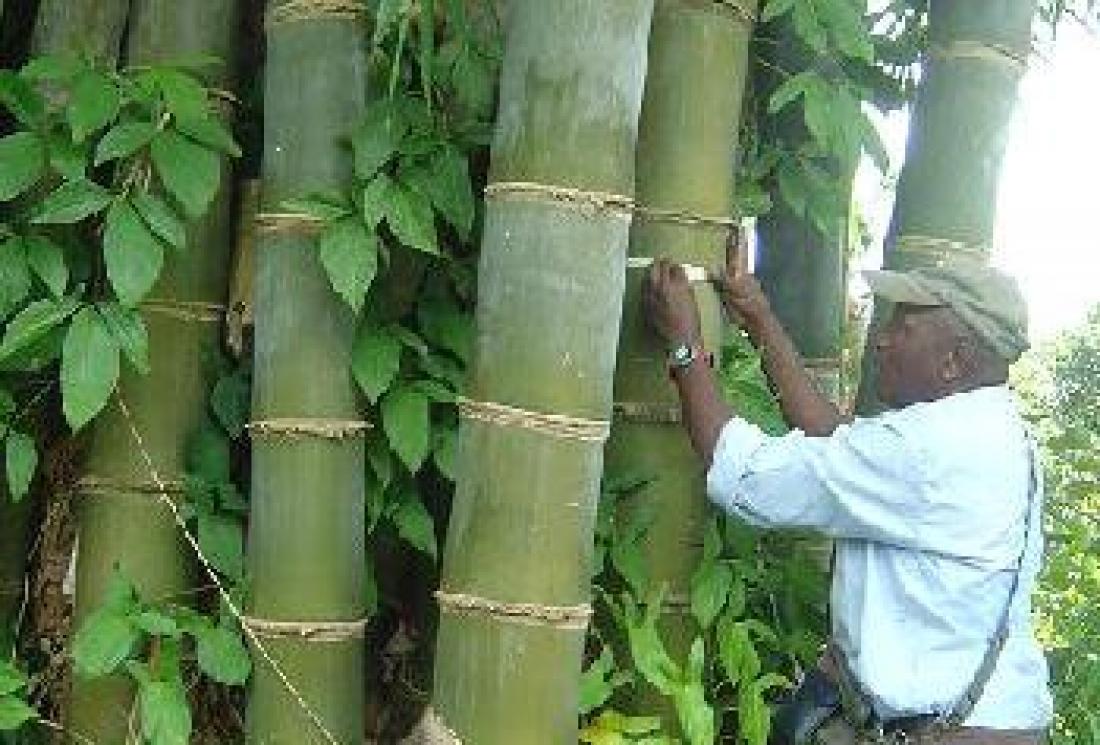When IDRC first supported pioneering research on these plants in 1979, the world knew little of their positive environmental potential. But this is changing thanks to work undertaken by the International Network for Bamboo and Rattan (INBAR), created by IDRC in the early 1990s as an extension of earlier IDRC-sponsored research.
In Allahabad, India, bamboo planting restored the fertility of soil degraded by brick mining, so farmers once again can grow crops. That project, which won the 2007 Alcan Prize for Sustainability, also raised the local water table by seven metres within five years.
A new bamboo plantation in China’s Guizhou province reduced soil erosion in a mountainous area by 75%, while making degraded farmland and forests viable again. Meanwhile, manufacturing charcoal from sustainable bamboo in India, Tanzania, Ghana, Ethiopia, Mozambique, and the Philippines has prevented the deforestation that results when trees are cut to make fuel.
New bamboo-based building techniques developed in Latin America and since transferred to Uganda and Kenya have similarly reduced reliance on threatened forests while avoiding the use of concrete, a major producer of carbon dioxide. How bamboo and rattan plantations can capture carbon dioxide already in the atmosphere is the subject of ongoing research.
Network based in Beijing
The first-ever international workshops on rattan and bamboo in 1979 and 1980, both held at IDRC’s Singapore office, blossomed soon after into the Bamboo and Rattan Research Network, the precursor to INBAR. Housed initially at IDRC, in 1997 INBAR became independent – and also the first international research organization to be based in Beijing. Since then, IDRC has supported INBAR’s work through a series of grants.
From the beginning, the researchers recognized the unique environmental role of these traditional Asian crops, which are “actually a palm (rattan) and a kind of big grass (bamboo),” INBAR director-general Coosje Hoogendoorn explains. “Like grass, you can cut bamboo and it will quickly grow back.”
Those grass-like qualities account for bamboo’s restorative roles within the environment. Bamboo has roots, for example, that remain in the ground after the poles are cut. Those resilient roots can prevent soil erosion, condition soil, and draw water closer to the surface in areas where the water table is low. Bamboo plants also absorb at least as much carbon dioxide as trees, providing a renewable buffer against global warming.
Income from incense
Another aspect of INBAR’s current approach that began within IDRC is the use of bamboo and rattan as a platform for practising “sustainable development.” Sustainable development means, essentially, that economic reward and environmental stewardship can be mutually reinforcing. And so, the research agenda for bamboo and rattan — which have numerous economic applications — has focused largely on finding ways for poor communities to add value to raw materials by creating finished products. This helps keep jobs and income in communities.
For example, one IDRC-supported INBAR project works with women in Tripura, India, who used to craft the raw bamboo sticks that were made into incense sticks elsewhere. Now, the women have taken over the rolling, scenting, packaging, and even marketing of the finished sticks.
“It has been possible for women with virtually no income to get a reasonable income that helps them take care of their families,” Hoogendoorn says. That, in turn, has provided added incentive to use pro-environmental materials — a win-win proposition, where economic success and environmental improvements are achieved together.



